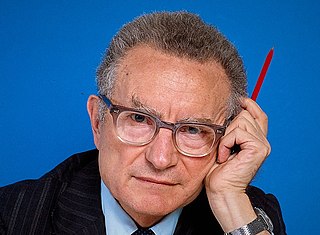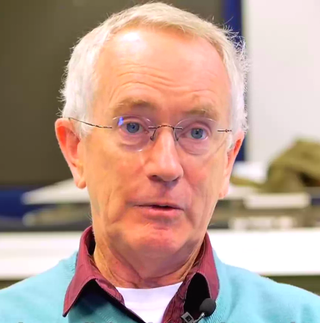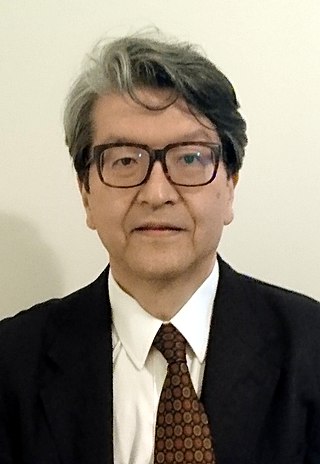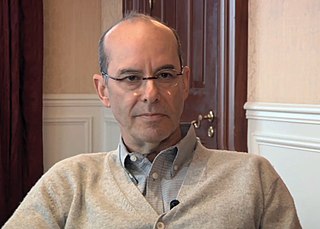Related Research Articles

Neoclassical economics is an approach to economics in which the production, consumption, and valuation (pricing) of goods and services are observed as driven by the supply and demand model. According to this line of thought, the value of a good or service is determined through a hypothetical maximization of utility by income-constrained individuals and of profits by firms facing production costs and employing available information and factors of production. This approach has often been justified by appealing to rational choice theory.

Evolutionary economics is a school of economic thought that is inspired by evolutionary biology. Although not defined by a strict set of principles and uniting various approaches, it treats economic development as a process rather than an equilibrium and emphasizes change, innovation, complex interdependencies, self-evolving systems, and limited rationality as the drivers of economic evolution. The support for the evolutionary approach to economics in recent decades seems to have initially emerged as a criticism of the mainstream neoclassical economics, but by the beginning of the 21st century it had become part of the economic mainstream itself.

Behavioral economics is the study of the psychological and cognitive factors involved in the decisions of individuals or institutions, and how these decisions deviate from those implied by traditional economic theory.

Lawrence Henry Summers is an American economist who served as the 71st United States Secretary of the Treasury from 1999 to 2001 and as director of the National Economic Council from 2009 to 2010. He also served as president of Harvard University from 2001 to 2006, where he is the Charles W. Eliot University Professor and director of the Mossavar-Rahmani Center for Business and Government at Harvard Kennedy School. In November 2023, Summers joined the board of directors of artificial general intelligence company OpenAI.

Paul Anthony Samuelson was an American economist who was the first American to win the Nobel Memorial Prize in Economic Sciences. When awarding the prize in 1970, the Swedish Royal Academies stated that he "has done more than any other contemporary economist to raise the level of scientific analysis in economic theory".
The Chicago school of economics is a neoclassical school of economic thought associated with the work of the faculty at the University of Chicago, some of whom have constructed and popularized its principles. Milton Friedman and George Stigler are considered the leading scholars of the Chicago school.

Steve Keen is an Australian economist and author. He considers himself a post-Keynesian, criticising neoclassical economics as inconsistent, unscientific, and empirically unsupported.

Institutional economics focuses on understanding the role of the evolutionary process and the role of institutions in shaping economic behavior. Its original focus lay in Thorstein Veblen's instinct-oriented dichotomy between technology on the one side and the "ceremonial" sphere of society on the other. Its name and core elements trace back to a 1919 American Economic Review article by Walton H. Hamilton. Institutional economics emphasizes a broader study of institutions and views markets as a result of the complex interaction of these various institutions. The earlier tradition continues today as a leading heterodox approach to economics.

Heterodox economics refers to attempts at treating the subject of economics that reject the standard tools and methodologies of mainstream economics, which constitute the scientific method as applied to the field of economics. These tools include include:

Geoffrey Martin Hodgson is Emeritus Professor in Management at the London campus of Loughborough University, and also the editor-in-chief of the Journal of Institutional Economics.

Kenneth George "Ken" Binmore, is an English mathematician, economist, and game theorist, a Professor Emeritus of Economics at University College London (UCL) and a Visiting Emeritus Professor of Economics at the University of Bristol. As a founder of modern economic theory of bargaining, he made important contributions to the foundations of game theory, experimental economics, evolutionary game theory and analytical philosophy. He took up economics after holding the Chair of Mathematics at the London School of Economics. The switch has put him at the forefront of developments in game theory. His other interests include political and moral philosophy, decision theory, and statistics. He has written over 100 scholarly papers and 14 books.

Ha-Joon Chang is a South Korean economist and academic. Chang specialises in institutional economics and development, and lectured in economics at the University of Cambridge from 1990–2021 before becoming professor of economics at the School of Oriental and African Studies (SOAS) in 2022. Chang is the author of several bestselling books on economics and development policy, most notably Kicking Away the Ladder: Development Strategy in Historical Perspective (2002). In 2013, Prospect magazine ranked Chang as one of the top 20 World Thinkers.

"The Use of Knowledge in Society" is a scholarly article written by Austrian-British academic economist Friedrich Hayek, first published in the September 1945 issue of The American Economic Review.

Katsuhito Iwai is a Japanese economist and critic. He has studied the theory of money, macro dynamics, evolutionary economics, philosophy of corporations, fiduciary law, and the history of sociology. His work includes the book, Disequilibrium Dynamics, and many articles published in academic journals. He has also written books and articles in newspapers and magazines for the general public on a wide variety of subjects ranging from global capitalism, post-modernity, civil society, money and language to literature and movies. His keen observations and analysis of the works of Shakespeare, Marx, J. S. G. Boggs, and Ihara Saikaku have established him as one of the foremost essayists in Japan.
Arthur S. De Vany is an American economist who has studied the Hollywood film industry and developed theories of evolutionary fitness focusing on nutrition and exercise in the paleo (caveman) manner. He is Professor Emeritus of Economics at the University of California, Irvine.

Joseph Henrich is an American anthropologist and professor of human evolutionary biology at Harvard University. Before arriving at Harvard, Henrich was a professor of psychology and economics at the University of British Columbia. He is interested in the question of how humans evolved from "being a relatively unremarkable primate a few million years ago to the most successful species on the globe", and how culture shaped our species' genetic evolution.
"Uncertainty, Evolution, and Economic Theory" is an article published in 1950 which was written by economist Armen Alchian.

Barry Robert Weingast is an American political scientist and economist, who is currently the Ward C. Krebs Family Professor at Stanford University and a Senior Fellow at the Hoover Institution. Weingast's research concentrates on the relationship between politics and economics, particularly economic reform, regulation, and the political foundation of markets.
Georg Nöldeke is an economist and currently serves as Professor of Economics at the University of Basel. His research interests focuses on microeconomic theory, game theory, and social evolution. In 2007, Georg Nöldeke's contributions to economics of information - in particular on the communication within financial markets - as well as to game theory and contract theory were awarded the Gossen Prize by the German Economic Association.
Richard McElreath is an American professor of anthropology and a director of the Max Planck Institute for Evolutionary Anthropology in Leipzig, Germany. He is an author of the Statistical Rethinking applied Bayesian statistics textbook, among the first to largely rely on the Stan statistical environment, and the accompanying rethinking R language package.
References
- ↑ Rowley, Charles (2008). The Encyclopedia of Public Choice. Springer Science & Business Media. p. 388. ISBN 9780306478284.
- ↑ "Paul H. Rubin". The Independent Institute. Retrieved 15 April 2016.
- ↑ WorldCat item entry
- 1 2 "Paul H. Rubin Curriculum Vitae" (PDF). Retrieved 20 February 2016.
- ↑ Felcher, Marla (November–December 1998). "Silent Recall". Mother Jones. Retrieved 21 February 2016.
- ↑ Dezhbakhsh, H. (1 August 2003). "Does Capital Punishment Have a Deterrent Effect? New Evidence from Postmoratorium Panel Data" (PDF). American Law and Economics Association. 5 (2): 344–376. doi:10.1093/aler/ahg021.
- ↑ Alfano, Sean (11 June 2007). "Death Penalty Deters Murders, Studies Say". CBS News. Retrieved 29 June 2016.
- ↑ "Paul Rubin". Emory University. Retrieved 20 February 2016.
- ↑ Carnahan, Ira (18 August 2004). "Uncle Sam's Malpractice". Forbes. Retrieved 21 February 2016.
- ↑ Aquino, John T. (19 March 2015). "Antibiotics Development Down, Congress, FDA Catch Up". Bloomberg BNA. Retrieved 21 February 2016.
- ↑ Tuschman, Avi (15 September 2015). "Inside the conservative brain: What explains their wiring?". Salon. Retrieved 21 February 2016.
- ↑ WorldCat book record